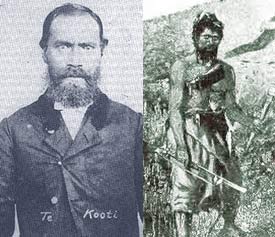Te Kooti in French

Percutio, Bill Direen's heroic attempt to bridge the abyss between Continental European and Kiwi culture, is now available online here.
In his introduction to the diverse and fascinating maiden issue of the journal, Bill explains that:
The aim of Percutio is to publish work in its language of creation so that each contribution may gain meaning from and offer meaning to surrounding works--be they drawings, photo-essays, meditations, extracts from writing-in-progress, travel notes, transcriptions or poetry.
This "trans-cultural" issue draws from the work of historians, poets, painters and researchers whom I have come across in New Zealand, Germany and France. Where space has allowed, translations accompany the original texts.
Bill and his team have translated three of my poems, including this one:
Te Kooti and His Natives Visit Terror Upon Matawhero
The pen had lost its firepower.
A sword through Biggs, the racist
magistrate: swords through his wife
his child. Blood pooled, and hardened,
begat a nimbus of flies:
'now hear ye
the doctrine of
the upraised hand.'
*
The equipment is well-maintained
but obsolete.
The stream flows between mountains
but its surface is smooth.
The quill is sheathed
but documents still circulate.
The doctrine is a book
with no back cover.
.....
Te Kooti et les indige\nes se\ment la terreur sur Matawhero translated by Titus team
La plume perd de son pouvoir.
Une e/pe/e au travers de ce magistrat raciste
Biggs : des e/pe/es au travers de sa femme
et de son enfant. Le sang a coule/ et s'est fige/.
Que naisse un nuage de mouches.
Maintenant e/coutez
la doctrine
de la main levee*
La machine est bien entretenue,
bien qu'obsole\te.
Le courant de/vale la montagne
bien que la surface en soit plane.
La plume reste dans son e/tui
mais les papiers circulent encore.
La doctrine est un livre
sans couverture.
*Emble\me de l'e/glise fonde/e par Te Kooti.
The poem refers to Te Kooti Te Turuki Arikirangi, the Maori resistance fighter and religious leader who escaped from imprisonment on the Chatham Islands in 1868 and shortly afterwards launched a devastating attack on the settlement of Matawhero, near present-day Gisborne on the East Coast of the North Island of New Zealand. The attack marked the real beginning of a four-year guerilla war which ended when Te Kooti and a small band of exhausted followers were forced to take refuge in the independent Maori state in the King Country region of the North Island.
After making peace with the government in Wellington Te Kooti built his Ringatu Church, which reinterpreted the Bible in the light of his own experiences (Te Kooti's escape from the Chathams was likened to the crossing of the Red Sea, and his guerilla war was compared to Jesus' forty days in the wilderness). The Ringatu - the word means 'upraised hand' - doctrine still has thousands of adherants in the eastern Bay of Plenty and on the East Coast.
How much of that information gets into my poem, let alone its French incarnation, I'm not sure! I think a lot of people would wonder about the wisdom of a Pakeha like myself writing about Te Kooti, let alone another group of whiteys putting the poem into French. In my defence I'd guess I'd say that my poem is written from 'outside', not inside - from the perspective of a mystified Pakeha observer of Te Kooti's war. The title of the poem is supposed to signal this distance, echoing as it does the headlines Pakeha newspapers carried after Te Kooti's attack on Matawhero.

4 Comments:
The only issue I have with your poem is that the perspective is a modern interpretation of a past event. If you were to situate yourself in those times, the word "racist" would not have been used. Also the savagery of Maori would have been more emphasised.
Is not all history or poetry or commentary - any attempt to deal with the past -is it not some kind of reinterpretation ?- it can never be "as it was" ? And even "as it was" was many perspectives -in partcular - that of the Pakeha of the time, the people far away from 'the action', people close to it, Te Kooti's thoughts etc and those Maori who sided with the Government, others involved, and so on...
But it's good you put your views of Map's poem here - there is sadly little interest generally in poetry...or perhaps people are a bit embarrased to comment (I think there is a lot more interest in poetry than we think) - this is kind of at "right angles" to Map's poltical stuff.
I thnk it's a good poem - it makes me think.
Une belle traduction. Merci! A nice translation, thank you very much. Dominique.
This photo although named Te Kooti is incorrect. It is Reverend Te Kōti Te Rato of Ngāti Kahungunu
Post a Comment
<< Home